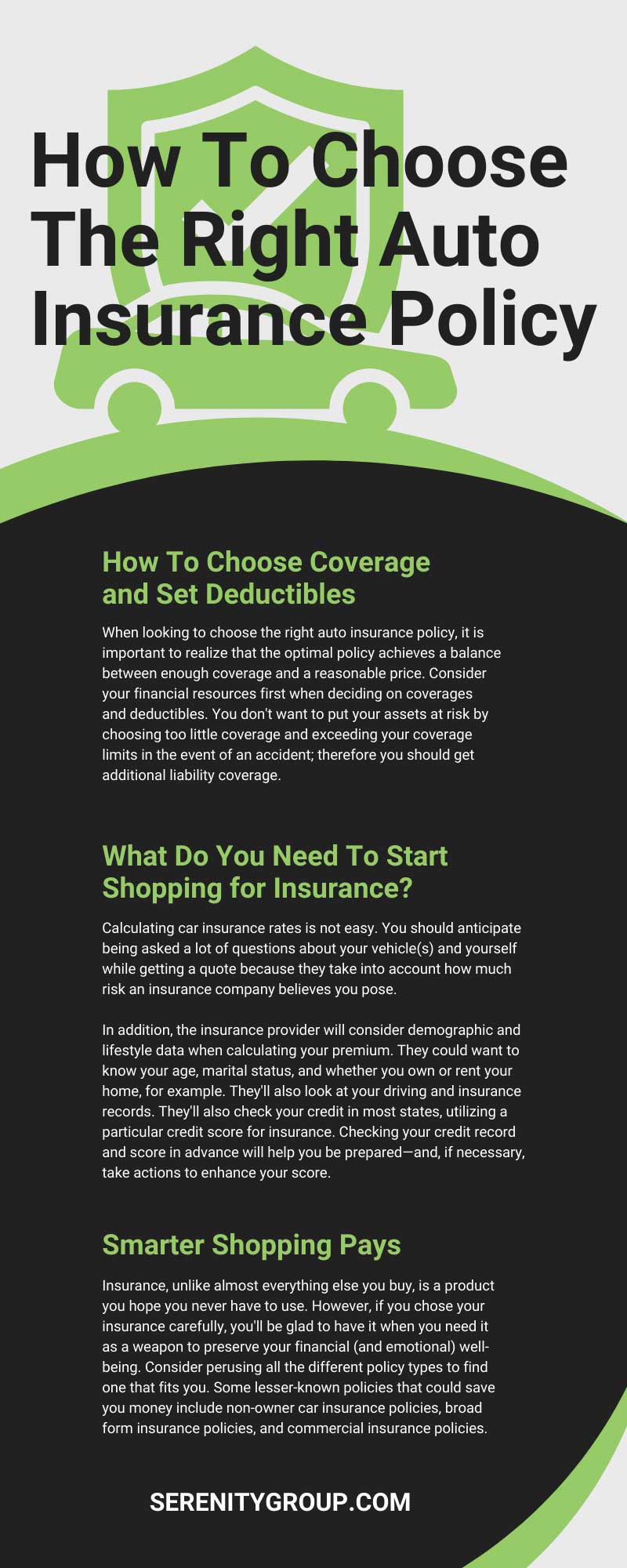How To Choose The Right Auto Insurance Policy

Choosing the correct auto insurance policy is a delicate balancing act that frequently involves weighing needs and preferences against costs. How do you pick the right auto insurance policy for your needs? It is feasible if you follow a few easy procedures, which include selecting adequate coverage for your condition, an affordable deductible, and a carrier with whom you can work. Here’s everything you need to know to choose the right auto insurance policy!
Why Do You Need Auto Insurance?
Although it may seem like a no-brainer, knowing why you need auto insurance will help you better grasp your goals when shopping for a policy. Because car insurance has so many moving pieces, knowing what you want out of the deal is a good place to start. Here are some things to think about:
- To drive lawfully, you must have insurance. Most states demand a certain amount of liability insurance.
- If you have an accident, you want to be able to meet your financial obligations. You could be liable for tens of thousands of dollars in repairs or medical treatment if you cause damage or harm.
- You want to make sure you’re driving a safe vehicle. Accidents, tornadoes, and theft are all possibilities for your vehicle. Insurance can aid in the recovery of your losses and the repair or replacement of your car.
- You wish to safeguard your financial well-being. Risk mitigation is the goal of insurance. If you can’t afford to replace a damaged car or can’t afford to pay for damages from a catastrophic accident, insurance can help you bridge the gap without wrecking your finances.
- You want a good night’s sleep. The wind is roaring and it’s 3 a.m. You had seen your neighbor’s patio umbrella rolling down the street earlier in the day, colliding with many parked automobiles. Do you go back to sleep or lie awake at night thinking about how your life might be turned upside down if your windshield was smashed overnight? Insurance does not erase anxiety, but it can help you cope with some of life’s minor mishaps.
How To Choose Coverage and Set Deductibles
When looking to choose the right auto insurance policy, it is important to realize that the optimal policy achieves a balance between enough coverage and a reasonable price. Consider your financial resources first when deciding on coverages and deductibles. You don’t want to put your assets at risk by choosing too little coverage and exceeding your coverage limits in the event of an accident; therefore you should get additional liability coverage.
However, having money in the bank may allow you to accept a larger deductible. You’ll save money on premiums year after year if you can afford to pay $1,500 out of pocket to cover the cost of a major occurrence. Also consider if you’d need or want to use insurance to cover a little repair, perhaps $500. If not, you may be better off increasing your deductible and saving the money now.
If an unexpected car expense would be a difficulty for you, you should choose a lower deductible. Although collision and comprehensive coverages are more expensive up front, they may be worth it if it means the difference between getting back on the road fast or going without a car until you can pay enough for repairs or a replacement.
Consider the value of your vehicle as well. If your car is older, the cost of additional coverage may not be justified. If you total a 16-year-old automobile valued $3,750 with a $1,500 deductible, you’ll only get $2,250. When you consider the monthly cost of collision and comprehensive coverage, you might be better off saving the money for a new automobile.
What Do You Need To Start Shopping for Insurance?
Calculating car insurance rates is not easy. You should anticipate being asked a lot of questions about your vehicle(s) and yourself while getting a quote because they take into account how much risk an insurance company believes you pose. When you’re ready to start looking for an insurance, you’ll need to obtain or know the following:
- A copy of your current motor insurance policy (if you have one)
- Your current yearly and monthly auto insurance prices
- Your vehicles’ VINs (vehicle identification numbers)
- Estimated annual mileage for each vehicle, including daily commute mileage
- All of your family members’ driver’s license numbers
- Your state’s insurance coverage requirements
In addition, the insurance provider will consider demographic and lifestyle data when calculating your premium. They could want to know your age, marital status, and whether you own or rent your home, for example. They’ll also look at your driving and insurance records. They’ll also check your credit in most states, utilizing a particular credit score for insurance. Checking your credit record and score in advance will help you be prepared—and, if necessary, take actions to enhance your score.
If you already have auto insurance and are satisfied with your existing provider, it is a smart place to start. Request that they evaluate your policy with you and make any recommendations for lowering your premiums or changing your coverage if they can make a compelling case for it.
Which Insurance Company Is the Right Fit?
Your final consideration is which insurance company is ideal for you after you’ve determined the right policy components and found the best rates. Aside from the budget, it’s critical to find an insurance company with a proven track record of financial stability. Information is available from rating agencies such as J.D. Power, and referrals from relatives and friends are another valuable source of insight. Also, listen to your intuition: Was each company’s encounter with you pleasant and professional? Do you believe they would be useful in the event of a mishap or loss?
Smarter Shopping Pays
Insurance, unlike almost everything else you buy, is a product you hope you never have to use. However, if you chose your insurance carefully, you’ll be glad to have it when you need it as a weapon to preserve your financial (and emotional) well-being. Consider perusing all the different policy types to find one that fits you. Some lesser-known policies that could save you money include non-owner car insurance policies, broad form insurance policies, and commercial insurance policies.
While it can be hard to find an auto insurance policy that fits you and your standards, we guarantee that if you have the patience, you will be happy with the policy that you end up with. If you are looking for a great company that would love to help you get settled into a new insurance policy, be sure to reach out to Serenity Group today!


Recent Comments